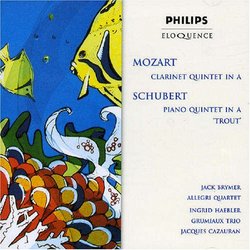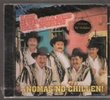| All Artists: Wofgand Amadeus Mozart, Franz Schubert, Jack Brymer, Allegri Quartet, Ingrid Haebler, Arthur Grumiaux, Georges Janzer, Eva Czako, Jacques Cazauran Title: Schubert: Pno QNT in A (Trout)/Mozart: Clar QNT Members Wishing: 0 Total Copies: 0 Label: Belart 450 056-2 Original Release Date: 1/1/2002 Re-Release Date: 1/28/2002 Album Type: Import Genre: Classical Styles: Chamber Music, Historical Periods, Classical (c.1770-1830) Number of Discs: 1 SwapaCD Credits: 1 UPC: 028945005621 |
Search - Wofgand Amadeus Mozart, Franz Schubert, Jack Brymer :: Schubert: Pno QNT in A (Trout)/Mozart: Clar QNT
 | Wofgand Amadeus Mozart, Franz Schubert, Jack Brymer Schubert: Pno QNT in A (Trout)/Mozart: Clar QNT Genre: Classical
|
Larger Image |
CD DetailsSimilar CDs |
CD ReviewsA lovely, tender "Trout", and a good version of Mozart's cla Discophage | France | 10/26/2006 (5 out of 5 stars) "The word that springs to mind to characterize this reading of Schubert's "Trout" Quintet by the ensemble gathered around pianist Ingrid Haebler and violinist Arthur Grumiaux in 1966 is "tenderness". Indeed, in the more than 20 recordings I know of the piece, no violinist delivers such a sweet and tender tone as Grumiaux, while Haebler displays a Mozartean lightness of touch and admirable clarity of articulation. Though never lagging, it is not one of those approaches that go for muscle and pressed tempos. The accents in the opening Allegro and fp marks in the ensuing Adagio (around 1:05) are mellow rather than muscular, and the viola and cello accompaniment eighth notes and triplets starting at 0:45 in the opening Allegro sound not as a train dashing full throttle (as they do in Thomas Adès' recent version on EMI - see my review of Adès: Piano Quintet; Schubert: "Trout Quintet") but as some obsessive and slightly quaint country square-dance. Eva Czako's cello tone is not in the same league as Grumiaux' violin and lacks some fullness, so that the cello and violin interplay in the 1st movement (at 1:45 and after) or the viola and cello cantilena starting at 1:21 in the Adagio are somewhat emotionally restrained, though far from unfelt. The scherzo is not rushed but is finely articulated, with a relaxation of tempo in the middle trio that avoids any sense of mawkishness. The "Trout" theme and variations (4th movement) displays again marvellous clarity of articulation from Haebler thanks to sparse and tasteful pedalling, and the variations unfold organically, with a fine sense of tempo unity, to an unhurried but witty coda. Following in the same vein, the Finale is forward-moving but not hard-pressed. If I were compelled to keep only one version (God forbids!), this would be one of the most serious contenders.
Philips initially reissued that recording with a well-chosen coupling consisting of Schubert's two string trios, also recorded by the Grumiaux trio in 1969. These are now available in an equally convenient mid-priced twofer from Philips' Duo series, paired with the Beaux Arts Trio's first recording of the piano trios (from 1966, not their 1984 digital remake: Franz Schubert: Complete Trios). So if you want to avoid vexing Schubert duplication, and despite the absence of anything that might qualify as "liner notes", this Belart CD (why Amazon labels it "Alex" eludes me) is the one to get, though the discmate - Mozart's clarinet quintet recorded by Jack Brymer and the Allegri Quartet in 1964 (originally paired on LP with Mozart's "Kegelstadt" trio for clarinet, viola and piano) - is not a very logical choice, as it shares neither composer nor interpreters. Arthur Grumiaux did indeed make a recording of Mozart's quintet, with dutch clarinettist George Pieterson in 1974, which would have been a better choice, but that has been picked up by Pentatone for reissue in SACD form with... the Beaux Arts trio's recording of Schubert's "Trout" (Schubert: "Trout" Quintet, D667; Mozart: Clarinet Quintet, KV581 [Hybrid SACD]). Oh well... And note also that the Brymer-Allegri version has known know many other CD reissues on its original Philips label, either coupled with the clarinet concerto (Colin Davis conducting the LSO: Mozart: Clarinet Concerto; Clarinet Quintet is the latest of these), or paired with Mozart's other quintets (for instance as Mozart: The Complete Quintets, Vol. 2). So the question of duplications probably can't be satisfactorily solved. Anyway it is a fine version, with an especially affecting 2nd movement, taken at a tempo more "Largo" than the "Larghetto" indicated by Mozart but beautifully restrained and deeply felt, and a light-footed and carefree finale. Brymer has a fine, silky sound and perfect articulation. Only in the opening Allegro, despite its tender expressivity, do I find that the close recording pickup of the clarinet prevents the "dolce" passages to register very well. All repeats are taken by the way, even in the Menuetto, which was not customary back then. Addendum from Nov. 10, 2007: apparently Philips Eloquence (an Australian budget-price label, I think) has reissued this marvelous recording, and someone has published the cover photo under this entry. Don't be mislead, though: this is the earlier Belart reissue (for which I have also provided a photo). " |

 Track Listings (2) - Disc #1
Track Listings (2) - Disc #1